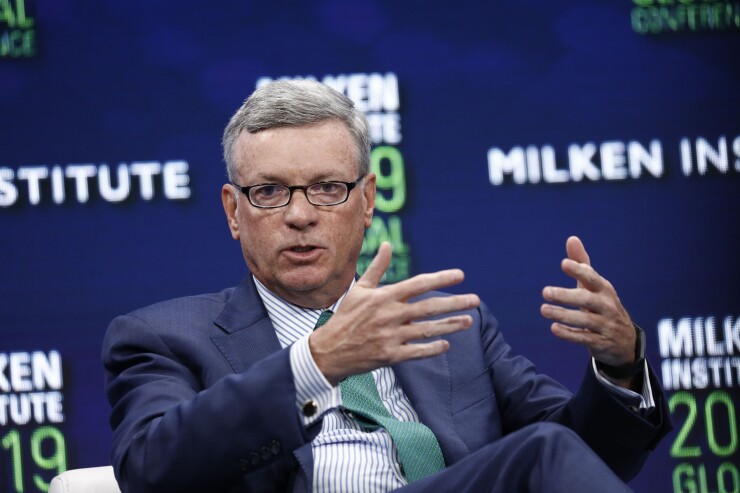Visa's response to Russia's invasion of Ukraine has hurt the company financially, though the card company says there are plenty of options to recover revenue.
"I've seen firsthand the pain brought about by Russia's attack, including our colleagues in Ukraine and Russia," Visa CEO Al Kelly said during Tuesday's earnings call.
Visa was among the dozens of U.S. firms to

Losing Russian volume from Visa Direct payments and other exposure to the country will cost Visa about 4% of its revenue for the year, though the card brand affirmed its 2022 growth outlook in the high teens and said that outlook included the loss from Russia.
For the quarter that ended March 31, Visa reported net revenue of $7.2 billion, an increase of 25% over the prior year. Non-GAAP net income was $3.8 billion, or $1.79 per share; up 27% and 30% respectively over the prior year and better than FactSet expectations of $1.65 per share.
Visa reported a spike in cross-border transactions connected to Russia in early March as the war commenced, then volume declined sharply after Visa discontinued operations in the second half of the month. "But even without the Russian business we will see growth in other markets," Kelly said, adding Visa will soon launch P2P payments in Israel via Visa Direct in partnership with a local app.
Visa Direct is adding new use cases and expanding its geographic footprint, Kelly said. "We are looking at remittances and the ability to pay gig economy workers to replace the volume from Russia," Kelly said, adding earned wage access disbursements to workers represent another growing source of revenue for Visa Direct.
"The reality is there are plenty of places to invest in Visa Direct but we have to figure out where the hottest opportunities are," Kelly said.
Visa reported some Russia-related expenses would be reduced, such as marketing costs and paying a local payment processor.
Visa will also gain revenue from acquisitions such as the data aggregator
"We didn't take the last two years off," Kelly said, adding Visa has expanded its acceptance reach in other areas of the world, and that as these economies emerge from the pandemic, payment flows from new markets will accelerate.
"The market hasn't seen the full [revenue] from the investments we made over the past 27 months or so," Kelly said. "As we start to come into a more normal environment we will start to see that."
Other global crises such as the supply chain crunch, inflation and the omicron variant of the coronavirus have not had a substantial impact on payment volume, according to Visa.
The coronavirus' omicron variant caused a short-lived blip in the global travel recovery that began in 2021, Kelly said. That recovery has since resumed and Visa's March cross-border travel payments volume is on pace to reach 2019's volume by year end. There has not been negative impact on non-Ukraine/Russia-related cross-border travel corridors, though Visa said travel in Asia still lags due to lingering coronavirus restrictions.
"While the geopolitical environment remains uncertain, we expect continued growth driven by a robust travel recovery and through the enablement of traditional and newer ways to pay globally," Kelly said.





